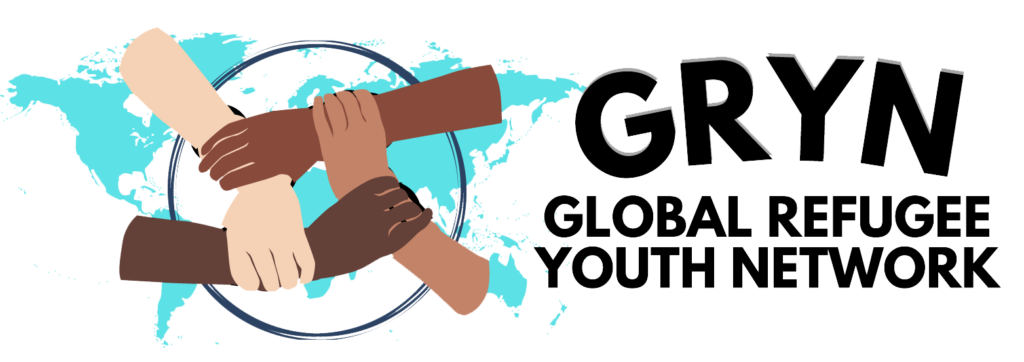
Women Equality Day
Embrace Equity
“All human beings are born free and equal in dignity and rights. As we reflect on the challenges faced by refugee women and girls, it’s crucial to recognize the strides made and the work that lies ahead”
The Global Refugee Youth Network Gender and Diversity Team held a Refugee Women-Led Conversation on 26 of August in honor of Women’s Equality Day. The panelists were refugee women who led various causes in their communities. These leaders include:

- Mary Iragi, is a 22-year-old refugee woman living with Albinism from the Democratic Republic of the Congo currently based in Kyaka ii Refugee Settlement Uganda. Mary is the project manager of Walemavu Ni Nguvu Group Kyaka ii which works with people living with disabilities.
- Rose Naboi is a South Sudanese refugee woman currently living in Kalobeyei Settlement in Kenya. She is the Co-founder and Head of administration of a Community-Based Organisation called Kalobeyei Initiative for Better Life. She is passionate about using the power of education to transform and change community mindset.
- Rebek Torres is a trans woman from Venezuela currently living in Ecuador. She is the Vice president of Lluvia de Arcoíris, an Advocate for the rights of LGBTQI+ people, youth, and children with HIV as well as equal rights and opportunities for refugees in Latin America.
Walemavu Ni Nguvu Group Kyaka ii, Lluvia de Arcoíris, and Kalobeyei Initiative for Better Life are some of the Refugee Youth Led Organisations that have received funding from the Global Refugee Youth Network (GRYN)
The session was titled ‘Women Leadership in Forced Displaced Settings’. The conversation was a great opportunity to explore more ideas on strengthening women’s leadership. This year’s theme is “Embrace Equity”. The purpose of this conversation was to empower refugee women and girls through the experiences shared therein and expose some of the challenges that women in displaced settings face. This day was also an opportunity to recognize the courage and perseverance of women who have fought for women’s rights and the ongoing struggle to achieve full gender equality.

We have come a long way and this is a good time to take stock of the progress refugee women and girls have made in leadership and consider how we can build on it in the years to come. Despite the progress that refugee women and girls have made within their communities and in their homes, we still have a lot of challenges. Women and girls’ voices are completely missing in key decisions about their lives, like business, property, or education. All over the world women are often paid less than men for the same work. Women are underrepresented in formal leadership roles. In many refugee communities, for example, only about a quarter of refugee community leaders are women.
Here are some of the challenges that were mentioned in the discussion:
- Discrimination against Albinos within the community has made many refugee Albinos young girls and women feel insecure as they are denied their right to socialize and move.
- Unemployment makes women and girls vulnerable to VAWG (Violence Against Women and Girls) such as Gender-based violence, Early pregnancy, and child marriages
- The lack of documentation makes access to education difficult, therefore making refugee women and girls unable to find decent employment.
- Limited access to health facilities and menstrual hygiene products.

Call to Action
Gender equality remains to be a great challenge in these current times, although efforts have been made, we are yet to achieve gender equality. We thank all our participants and panellists for sharing with us very insightful thoughts on achieving women’s empowerment which is a step to gender equality.
All human beings are born free and equal in dignity and correct, we, therefore, call on all individuals, organizations, and activists to continue sensitizing communities to end discriminatory actions against refugee women, girls, and the LGBTQI+ communities.
We call on:
- Donors to continue implementing activities targeting girls and providing funds to organizations led by young refugee women. This will empower women to take up leadership roles in their communities therefore creating role models for young girls to look up to. It is extremely important for donors to understand the local circumstances and the general situation of the refugee context, in order to provide long-term and flexible funds to enable GRYN to provide funds to more projects for refugee youths especially young women and girls as beneficiaries.
- Refugee leaders, Refugee Youth Led Organisations, and all relevant institutions to create safe spaces where refugee women and girls can be meaningfully engaged and empowered.
- Stakeholders in education to create more avenues for refugee women and girls to access education opportunities by providing scholarships,
- We call for Gender Responsive and Transformative education for Refugee Women and Girls. Gender Responsive and Transformative education will take into account the specific needs that girls have, prevent and respond to GBV against refugee young women and girls which will in turn increase the number of girls in schools.

“One of GRYN’s principles is Inclusiveness: GRYN celebrates the beautiful diversity of refugee youth and actively seeks to involve young refugees from all contexts, regions, nationalities, ethnicities, religions, of all genders, those who are part of the LGBTIQ+ community, those who are living with disability and any young refugee who brings any other aspect of diversity.
Authors
Farida Luanda and Oricia Ngenyibungi.
